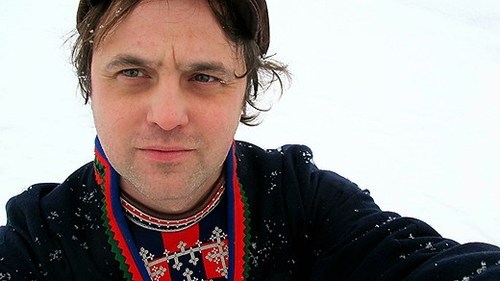
Max Mackhé, photo © Ellen Berit Dalbakk
A while ago I posted a relatively long post about the problematic aspects of appropriating a Saami identity as an artistic statement as manifested by Lisa Vipola’s art exhibition Authentic Saami Art. Shortly after, the Swedish musician Max Mackhé – a speaker of North Saami who has made a name of himself by advocating Saami rights and protesting against neo-colonialism in Sápmi through the medium of music in North Saami, Swedish and English – made headlines by being included on the Norwegian Saami parliament electoral roll, and last week I sadly didn’t have the time to comment on this story, so I will take the opportunity to do so now instead, even if I might not do so in as much detail as I did when it came to Vipola’s exhibition.

Max Mackhé, wearing a South Saami gapta from Härjedalen. It is questionable if he’s been allowed to use the pattern on the boenge-skuvmie, and by wearing a gapta he is engaging in a common settler habit, i.e. that of trying to become the Other and thus speak for and over them, simply by masquerading as one of them.
Ethnically speaking, Mackhé is not Saami and his inclusion on the electoral roll is both problematic and infuriating to a large number of people as he lacks Saami ancestry. What is more, Mackhé has stated that the only reason as to why he chose to apply to become included on the electoral rolls in Norway and Sweden is because a Saami politician encouraged him to do so, based on his commitment to Saami human rights. And now, shortly before the upcoming elections in Swedish and Norwegian Sápmi he’s been included on the Norwegian electoral roll, but the Swedish Saami parliament has yet to either approve or dismiss his application, which makes the entire story all that more complex.
One of the things that bugs me about Mackhé’s, ‘stunt’ is that to him being included on the list was “most of all a test to try out the claims made by a Saami politician”, i.e. that he would be included on the electoral roll if he applied for it. I do admire Mackhé in many ways, but I’m disappointed and upset with his choice to try to appropriate a political space in our community that he is not, as far as I am concerned, entitled to. It is not possible to study in order to become Saami, and his attempt to take what Vipola started by coming out as a Saami woman a couple of weeks ago even further is highly problematic. It does not matter that Mackhé has done many positive things in the past, what he has done here is not something that can or should be excused, and I am of the opinion that if Mackhé wants to regain his credibility as a Saami ally, he has to renounce all his claims of Saaminess and instead let those who actually are Saami use their own political platforms without them being co-opted by ‘well-meaning’ settlers. If Mackhé gets the right to vote in the Swedish Saami parliament, the entire parliament will lose its credibility, and whatever decision ends up being made, it has to be compared to the decision made to deny Malin Linder, an actual Ume Saami woman without any knowledge of Saami, a place on the electoral roll.

Max Mackhé at an anti-mining protest, photo © Anna-Maria Ahén
What’s making this more complicated is that Mackhé, by virtue of having been raised in Sápmi and having been immersed in the culture for decades does identify as Saami, but he does not have any Saami heritage, so his own identity is only based on the first part of the Norwegian definition, i.e. that anyone who identifies as Saami and either fulfills the following commitment
a) har samisk som hjemmespråk, [speaks Saami at home]
eller [or]
b) har eller har hatt forelder, besteforelder eller oldeforelder med samisk som hjemmespråk, eller [has or have had parents, grandparents or great-grandparents who speak or spoke Saami at home, or]
c) er barn av person som står eller har stått i manntallet [is the child of anyone who is listed or has been listed on the electoral roll]
can be included on the electoral roll to the Norwegian Saami parliament. What this means is that anyone who speaks Saami by Norwegian standards is Saami, as long as they think of themselves thusly. This is in stark contrast to both the Swedish and Finnish laws. According to the Swedish law being Saami equals self-identifying as Saami and
1. gör sannolikt att han eller hon har eller har haft samiska som språk i hemmet, eller [being able to prove that they speak or have spoken Saami at home, or]
2. gör sannolikt att någon av hans eller hennes föräldrar, far- eller morföräldrar har eller har haft samiska som språk i hemmet, eller [being able to prove that one of his or her parents or grandparents speak or have spoken Saami at home, or]
3. har en förälder som är eller har varit upptagen i röstlängd till Sametinget. [having a parent that is listed or has been listed on the electoral roll to the Saami parliament]
What differs between the Norwegian and Swedish law is in theory one single word; i.e. ‘either’. Whereas the Norwegian law makes it clear that the linguistic criterion is optional if any of the other two criteria have been fulfilled, the Swedish law makes it clear that the linguistic definition and the way it is linked to heritage is central to the understanding of Saaminess. Without a linguistic heritage, one does not qualify as Saami, but that heritage can extend back two generations in Sweden. One of the reasons behind this can be attributed to the fact that its illegal to record ethnicity in Swedish censuses; as race cannot be marked in any way, language has in many ways come to replace blood as a symbol of heritage and belonging. In other words, where other indigenous communities may use blood status as a way to decide who is and isn’t indigenous, the Swedish legal definition of Saaminess uses a combination of language and relationships instead.
Yet another reason as to why the current criteria may be too lax or too restrictive, depending on to whom they are applied comes down to on one hand their refusal to take the impact of linguicide within Sápmi into account and on the other their links to the previous Swedish Saami law from 1928 that many non-Saami still believe is a valid definition of Saaminess. This law stated that
”Lapp” är den som har renskötselrätt. [A Saami is a person with the right to herd reindeer]
a) Endast den vars närmaste förfäder varit enbart renskötare får ha renskötselrätt. [Only a person whose parents have been reindeer herders may become a reindeer herder]
b) Samer utan renskötselrätt skall betraktas som ”övrig befolkning”. [Saami without the right to herd reindeer shall henceforth be seen as belonging to ‘the rest of the /Swedish/ society]
and a large number of in particular South and Ume Saami lost their reindeer herding rights as an effect of the law, and this in turn led to them being excluded from the Saami community by a settler government which at the same time did not afford them the same rights as ethnic Swedes.
But back to the current laws; people wanting to be included on the Finnish Saami parliament’s electoral roll have to fullfil even stricter criteria than those in Sweden and Norway; to be Saami in Finland a person has to self-identify as Saami and
1) han själv eller åtminstone någon av hans föräldrar eller far- eller morföräldrar har lärt sig samiska som första språk, [he or at least one of his parents or grandparents speaks or spoke Saami as their first language]
2) han är efterkommande till en sådan person som har antecknats som en fjäll-, skogs- eller fiskelapp i jordeböckerna eller uppbörds- och mantalslängderna eller att [he is the descendant of a person that has been registered as a mountain Saami, forest Saami or Sea Saami in the land register or census records, or that]
3) åtminstone någondera av hans föräldrar har antecknats eller hade kunnat antecknas som röstberättigad vid val av delegationen för sameärenden eller sametinget. [at least one of his parents has been listed as eligible to vote or could have been listed as eligible to vote in the Saami parliament]
As one can see, the importance of language is evident in all three laws, but whereas the Norwegian and Swedish laws are happy to count anyone who counts Saami as their home language as Saami, the Finnish law explicitly states that Saami has to be the first language of the family, which is a lot stricter and which in turn may harm the smaller Saami communities – affected by an ongoing language death – in Finland.
While Mackhé does believe that the legal definitions of Saaminess are too lax, and he doubts that he will use his right to vote in the Norwegian Saami parliament, he still maintains that he has a right to participate in Saami politics, based on his 20 years of activism and the fact that he’s resident in Sápmi and speaks North Saami and feels Saami most of the time. Whether this makes him Saami or not is doubtful and as I’ve already stated, I feel as if he needs to renounce his appropriated identity, and go back to being an ally.
But at the same time one has to remember that we as a community have the right to decide who is and who isn’t Saami, and as far as Mackhé goes, the Norwegian Saami parliament has decided that he qualifies as ‘one of us’. In other words, who am I as a Saami individual to question him, if one of our parliaments have chosen to accept him as a Saami man and bestow voting rights upon him?
The truth is that Mackhé’s current inclusion on the electoral roll highlights one of the complicated parts of the legal definition of Saaminess, i.e. the part of the law connected to self-definition. In a Saami context, I would like to claim that a person’s self-definition cannot stand purely alone – it is tied to the act of belonging to a community by virtue of being related to other Saami, and while this does not in theory exclude Saami who have lost touch with their roots, it emphasises the fact that one has to be related to other Saami, self-identify as Saami and perhaps most importantly of all be considered to be Saami by other Saami in order to be considered ‘real’ or ‘authentic’. The sad truth in today’s society is that our Saami identities and the authenticity of the same has become sorely convoluted in a system where it is based on a law made by a settler government, and thus it is questionable if the current laws can truly be seen as an indicator of who is and who isn’t ‘a real Saami’.
Update: Max Mackhé has written about his inclusion on the Saami electoral roll on his blog, and many of the questions raised above have been addressed in his text. He’s also explicitly stated that he won’t use his right to vote in the Norwegian Saami parliament, which is a very positive thing.